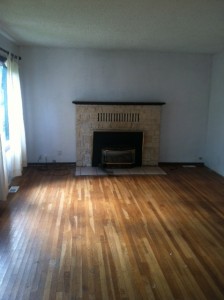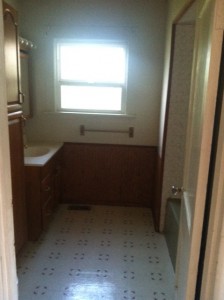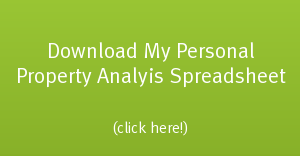I’ve been busy. Very busy.
And no, not just writing this 2300 word post (my longest to date!)
You might remember several weeks ago when I mentioned I had a new property I was excited to be closing on soon. I finally closed last week and can finally devote some time to telling you all about it. Ironically, if you have been following my blog posts from the beginning – you probably already know a bit about it.
Over two months ago I wrote an article here titled, “You Killed My Father – Prepare To Die: And Other Lessons In Finding Good Deals” which I chronicled my mistakes in not pursuing a property quick enough. The house, I mentioned, was perfect – but not just for a flip or a rental – but perfect for ME. I wanted this house for my new home, something for my wife and I to move into, decorate exactly the way we wanted, paint the walls any color we wanted, and really spend the time making it perfect for us. However, I was too slow in pursing this home and it was taken before I could get to it. Or so I thought- because this perfect home that I missed out on is going to be my new home.
For the past five years, every home we have lived in has had an agenda attached. We have moved five times in five years (yikes!) in an effort to jumpstart our investments. We would generally move into a home we had remodeled while it sat on the market to sell (to minimize our holding costs) or simply buy a home planning on turning it into rental soon. Either way, with each home we designed the home to fit either a flip or rental – but not for us. This is why I am so excited to finally have a place to call home. I might even paint a wall red- just because I can.
The rest of this post is dedicated to teaching you exactly how I purchased this home – I’ll call it “Church Street” (because, surprise – it’s on Church Street) – and how I did it with no money out of pocket (and even received a check for almost $9,000 at closing!)
The Home:

Living room with natural gas fireplace and hardwood floors
Church Street is a three-bedroom, one bath home located just a few blocks from where I currently live. I was first attracted to the home because of the large yard. My wife dreams of having a large garden and this home will allow for that. It also has:
- Three bedrooms, one bathroom
- A one car garage
- A new roof
- Newer kitchen cabinets
- Hardwood floors throughout the living room.
- Primarily cosmetic fixes (paint, carpet, etc).
As I mentioned in the previous article, after missing my chance on this perfect home I re-dedicated myself to moving quickly when opportunities arise. The home had sat on the market for several weeks before I even noticed it, and it took me almost a week to get inside to see it after that. By this time, the home had received another offer and the bank (this was a bank repossession) had accepted it.
However, if there is one thing I’ve learned about bank repos in the past several years is that 50% of the deals that go “pending” (there is a signed deal) do not actually close. Usually something goes wrong – from difficulty financing, a scary inspection report, or one of a hundred other possibilities. This is why I believe it is imperative to put in a “back-up offer” on any property that I am interested in that goes into a pending status.
So, I submitted my back-up offer and waited.
My Offer
My offer was as follows:
- Purchase Price $65,000.00 – The listing price was $75,000.00, so I offered $65,000.00. Other homes (non-REO’s) sell for a minimum of $130,000 in this town, going up to $200,000 in some neighborhoods. To learn more of how I determined my purchase price, check out my article How to Quickly Analyze a Single Family Home for Investment
- $1000.00 earnest money – Earnest money is money paid at the time you submit an offer. It is a way of telling the seller “I am serious about buying this home, and I am pledging this money to prove it.” Should I back out of the deal for no good reason, the seller is able to keep my earnest money as payment for their trouble in dealing with me.
- 10-Day Inspection Period – I included in my offer a ten-day inspection contingency. What this means is that I have ten days to inspect the house and determine of the condition is good enough for me to purchase. If I find anything with the house I don’t like, I am able to back out of the deal and get my earnest money back within ten days. This is a standard part of most deals.
- Financing Contingency- Just as I could back out of the deal if I found something in the inspection, I also included a contingency that allows me to back out of the deal if I cannot obtain financing.
- 45 Day Closing (or sooner) – I wanted to give myself plenty of time to get this deal closed because I was not 100% sure of how I was going to do it. I knew I wanted the house and that it was an amazing deal, so I gave myself plenty of time to work out the details.
Normally when I purchase a home, I offer differently. I like to do a preliminary inspection and line up my financing first so I don’t need to use those contingencies. Why? A seller is much more willing to accept a lower price when the offer is “cleaner.” The fewer contingencies, shorter closing date, and more earnest money offered the more apt the seller will say “yes.” However, this home is different. Funding a flip is easy. Funding a long term buy-and-hold is easy. Funding a home for myself to live in is not so easy. I have too many mortgages in my name and not enough “real” income to get another mortgage, so trying to get a long term mortgage is next to impossible.

Bathroom - complete with green bathtub
However, I knew the deal was good.
I have always believed that if you find a good deal, the money will find you. So I gave myself the ten-day inspection, financing contingency, and a long close date so I could have adequate time to put the deal together and find the money. More on that in a little bit. First, I needed to inspect the property.
The Inspection
Back to the story. After I offered on this home two months ago, and was rejected, I placed my back-up offer in and had to wait. I actually forgot about the home and moved on. Then, nearly a month later, I received a call from the agent. The other deal had fallen through. The prospective buyers paid for a full inspection and became nervous when the report came back. The selling agent received a copy of the inspection report, which I dissected with extreme care. Besides the obvious cosmetic flaws this home has, the report also listed two other important items:
- Foundation Problems
- Electrical Problems.
These are what scared off the other buyers – and rightly so. Foundations and electrical work can be the most costly items to repair on a home. They are also issues that must be dealt with by professionals, so homeowners do not know what a bad problem is from an easy-to-fix problem. These problems don’t scare me, though, but instead simply offer less competition and, in this case, led me to a killer deal.
I immediately scheduled an inspection with both a local electrical contractor and a foundation expert. Both these inspections cost me nothing – as I called contractors I use often and simply asked for a “bid.” It is important to keep good relationships with your contractors. Furthermore, they know I will probably use them to do the work, so estimates are usually free. I am not suggesting using contractor’s bids as your inspection, but when you have a good working relationship with your contractors, you can use their knowledge to fill in the pieces on unforeseen problems.
As I was hoping, the electrical issues were fairly common and fixable – wire splices in the attic without junction boxes, incorrect circuit breakers in the main panel, and non-grounded outlets using 3-prong plugs. Don’t worry if you don’t understand this stuff – just know that it is fairly easy to remediate.
As for the foundation, we determined that there was rot in a couple of the main support beams, but the joists looked fine. Homes in my area, including this one, often sit on a cement perimeter foundation with a crawlspace below the home. This allows for fairly easy access and repair. The foundation would cost no more than $500 to repair.
I now knew the house was exactly what I wanted. It was time for the hardest part (or so I thought) – finding the money.

Nice Cabinets, Terrible Everything Else
Putting Together The Financing
Now that I had a signed deal with the bank and had thoroughly examined the property for major issues, it was time to move forward and find money to buy the home. With this home, I had three goals for myself:
- Buy the home with no money out of pocket
- Get repair money given to me at closing
- I needed at least five years on the loan (I need time to pay off the loan or refinance)
When I submitted the offer originally, I included a pre-approval letter from a hard money lender. I did not know if I was going to use this lender or not, but it didn’t matter. Bank REO’s only required that a buyer submit a pre-approval with the offer – you are not obligated to use that pre-approval for the purchase. I knew that I could fall back on this hard money lender if needed, but I wanted longer terms than he would give me.
I began to tell everyone I knew about the deal. Within two weeks, I had two different people offer the money to me. The first was a hard money lender I had used in the past. The second was the father-in-law of an investor friend of mine. This friend mentioned to his father-in-law that I was looking to finance a home for me and my wife and he agreed it would be mutually beneficial to fund the deal. Both agreed to fund the entire deal, plus an extra $9,000, on a five year note.
Now, before you think that this was super easy to do: both these offers for financing were based on years of building relationships. I had done several other deals with the hard money lender and had never been late on a single payment nor given him cause to worry. I’ve said it many times before – this is a business of trust. As for my friend’s father-in-law, I have spent the last four years helping both my friend and his father-in-law with maintenance and other jobs for their own homes and their rentals. I have built a good reputation as someone trustworthy and capable.
If you are just starting out, you may not yet have built these relationships. It is important that you start immediately. I have found that there are several key ways to develop your reputation, and it is important that you do all of them:
- Be knowledgeable in what you are talking about.
- Always do what you say you are going to do.
- Work hard, always.
- Help others whenever you can, even if you might not get something out of it.
- Be above reproach in every situation.
It can take years to build a good reputation but only one incident to destroy it. Guard your honor and reputation with care and continue to build relationships with those around you.
I ended up choosing to work with my friend’s father-in-law as a private lender and submitted his information to the closing title company.

I Think I'll Get a Riding Lawnmower
Closing The Deal:
Two weeks after completing my inspection, I purchased the house. Yes, I had 45 days to do so, but I was eager to get working on it. After paying closing costs and fees, I received a check at closing for just under $9,000.00 for repairs on the home. Next time someone tells you that no-money down deals just don’t happen anymore – don’t listen. They do happen, and they happen every day.
There is another long story I would like to tell you about how I lost $1000.00 by not reading my contract, but I’ll save that for another day.
I will be updating you all in the coming weeks as the home is tore apart and put back together into my own dream home. I will be doing some of the work myself over the coming week but hiring a crew to do a significant portion. I am working on the tightest budget I ever have, but am doing so on purpose. Being my own home, I want to keep the costs down as low as possible so I can pay off the entire mortgage quickly. My goal is to pay the entire home off before the end of my five year loan is up. If not, I could always refinance the note – but having a debt free life is my ultimate goal.
Thanks for taking time to read this post! If you know someone who would benefit from reading this, please share it on your Facebook!
Also, if you have any question or suggestions, please comment below!
P.S. looking for hard money loans in California? Be sure to check out my friends over at northcoastfinancialinc.com. They have very competitive rates, can fund within a week and specialize in fix and flip loans and other hard money loans.







 If this is your first time here at Real Estate In Your Twenties.com - welcome!
If this is your first time here at Real Estate In Your Twenties.com - welcome! 





